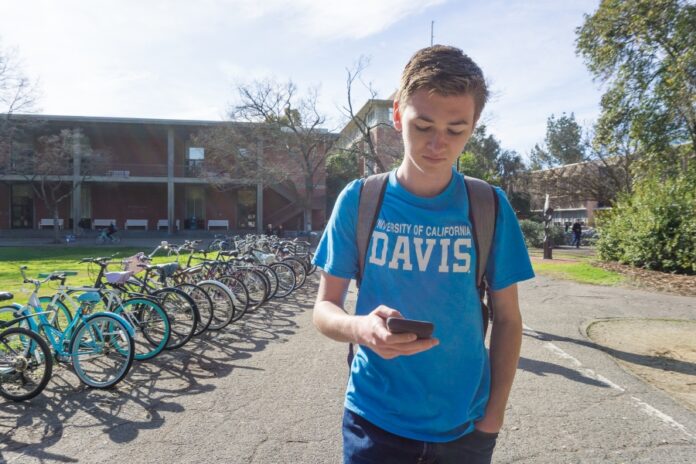How students can change the way they use social media, how they are currently affected by it
Decades ago, the move to college came with tears and uncertainty when parents left their children in a dorm, not knowing when they’d next see their face or hear their voice. Today’s technology, through FaceTime, phone calls and text messaging, have made this separation seem far less severe with parents and high school students only being a tap of a screen away.
Despite increasing communication, social media can also have negative consequences when it comes to time management and students’ self esteem. Liking posts, scrolling through endless feeds and becoming distracted from the outside world are all burdens that come with the glowing rectangle most students (and people in general) carry. Getting sucked into the digital world at students’ fingertips can slowly start to become a heavier burden than originally anticipated.
Fifth-year computer science major Kush Patel only recently picked up on some of the more popular social media apps like Instagram, though he previously used other platforms like Facebook.
“I generally use social media for texting friends,” Patel said. “The other side of it would be searching Reddit or Instagram for content and different material.”
While Patel has noticed the common habit of students to immediately check their phones and social feeds for new updates right after a lecture period, he feels that the effects of that habit depend on the ability of the person’s self-restraint.
“If you’re in class and you’re going to text, you might as well not show up to class,” Patel said. “After class, you open up your phone, it’s your personal time, why not? I think it’s their own choice.”
In Patel’s case, his focus has been largely placed on his academics and trying to graduate as soon as possible. He finds that social media, as a result, takes a backseat most of the time, but he indulges whenever free time allows it.
“There’s no universal rule that says, ‘Oh, social media is bad,’” Patel said. “I think it comes down to the mindset of the person using it, whether they are easily distracted or they’re not stable in the sense that, if someone says something crazy in a group chat, they might lose it.”
Patel, however, has encountered students who, like himself, do not frequent apps or social media.
“Some people barely use it,” Patel said. “My first roommate, he didn’t use social media at all. I know other people who use social media a lot, and they’re still just as successful and social.”
Patel recognizes the potential that social media has, as he also commented on the ways it can encourage people to express creative interests and find outlets to share information. His reliance on social media has dwindled over the years, which has been a positive change for him overall since he now has more time to focus on what he feels to be important in his own life.
Patel tries not to compare himself to what he sees his peers doing, instead choosing to support and congratulate their accomplishments and using that motivation to carry out his own goals.
Hugo Hernandez, a UC Davis alumnus currently working with the Early Academic Outreach Program in Undergraduate Admissions, discussed his use of social media in his academic career and how he has since shifted his focus after being away from school.
“I used social media a lot more when I was younger,” Hernandez said. “My friends and I mainly used it to promote events going on around campus or to connect with one another about classes. It was also great to let my family from far away see everything that I was involved in and doing over here while they were over there.”
Since Hernandez has started working frequently with students, he has noticed their reliance on their phones and social media. Even as a student, seeing students reach for the phones after lecture was something he felt should change.
“That was actually a pet peeve of mine, seeing students pull out their phones just looking at a screen,” Hernandez said. “I tell the students I work with all the time to get off the phone for a few minutes and go outside, enjoy nature. That was how we used to play and socialize as kids. Now, people would rather look at a screen for hours instead of having actual conversations.”
Hernandez has seen considerable improvements in his life since limiting his social media usage and implores students to do the same. He stressed the value of reaching out to friends to meet for coffee or lunch for personal interaction, something he feels is becoming too scarce in our current society.
“I have learned to not be so reliant with my phone and technology,” Hernandez said. “Sometimes it’s nice to relax and use the phone for music or to find information. I think we need to get back to appreciating time spent with friends and family in real life.”
While social media may not be going anywhere in the near future, it may be time to reevaluate its usefulness. Students should consider alternative ways to spend time and connect with those they care about by engaging in activities that allow for quality time to be shared. Although photos and videos may last forever, a crucial conversation or much needed gathering can make a profound impact far greater than any social media utility can create.
Written by: Vincent Sanchez – features@theaggie.org





